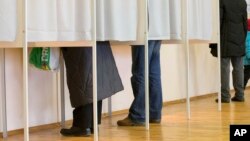Balloting has started for next month's general election in Estonia, an online voting pioneer, amid tight protective measures a day after Microsoft warned that hackers linked to Russia had allegedly targeted democratic institutions in Europe.
Kristi Kirsberg, media adviser to Estonia's electoral committee, said Thursday that the Baltic country — the first in the world to use online balloting for a national election in 2005 — has trained candidates to properly secure their homepages and was closely tracking fake news and disinformation.
Apart from educating candidates on cyberthreats, special attention has been given to protecting political parties' websites, she said.
Excluding "some minor Facebook postings," no interference attempts have been reported. Kirsberg said Estonia's government agencies have set up hotlines to major social media companies like Facebook, who are ready to assist election officials.
"The State Chancellery has helped us to build ties with Facebook, Twitter and Google so that we can quickly inform them in case some kind of disinformation on the election starts to spread," Kirsberg said. She said that one government official was fully focused on monitoring domestic, Western and Russian news sites as well as social media.
Microsoft said Wednesday that a hacking group identified as Strontium, with alleged links to Russia, had targeted email accounts within think tanks and nonprofit groups in six European countries, not including Estonia, ahead of the EU parliamentary elections in May.
The U.S. tech company urged politicians and authorities to keep in mind that cyberattacks and hacking aren't limited to election campaigns but have targeted groups dealing with democracy, electoral integrity, and public policy.
Poll leader
Many Estonian experts don't expect neighboring Russia to meddle with the former Soviet state's election as Moscow isn't seen gaining much from such activity.
Estonia's governing Center Party, which is led by Prime Minister Juri Ratas and caters to the country's large ethnic-Russian minority, is leading in polls and Ratas is expected to have good chances of forming the new Cabinet.
About a third of Estonia's eligible 958,600 voters are expected to cast ballots online to renew the 101-seat Parliament in the small country of 1.3 million. The election is March 3.
The online voting system is based on Estonians' solid trust in their government, which has provided over one million compulsory ID cards, complete with a microchip, enabling secure identification on the internet.
Ballots are cast through a government website. Should a person change their mind, they can go back into the site or vote at a traditional polling station to change their vote during the advance voting period until Feb. 27.




